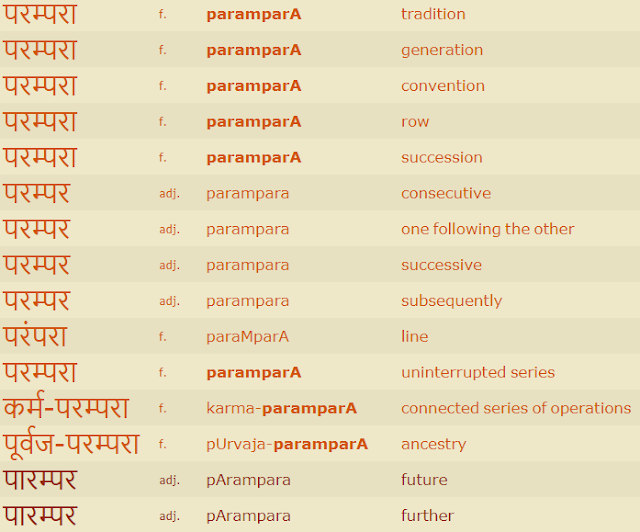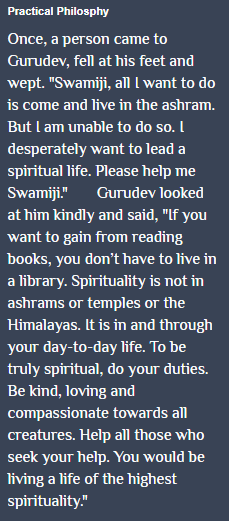This is a big one, dear reader - get a cuppa and settle comfortably...
It is sad that in all religions, demons and rakshasas are hiding behind robes and doctrines. Indeed, they are twisting those doctrines to suit their own ends.
However, it is equally sad that so many then condemn the entire religion based on the misdeeds of the humans misusing them - be it Christianity, Judaism, Islam, Buddhism, Hinduism... All of these have sound philosophies and offer succour and life guidance to their adherents. When studied well, there is actually little difference between them; eat well, speak well, seek the auspicious company and avoid the foul, live moderately, walk lightly upon the earth, work on your inner being that it expands to greater possibilities and feeds your talents... that the pursuit of happiness is noble as long as one is clear what constitutes that happiness - that it should not be found at the cost of others. It's not to be found in the world of objects.
Have you had a role model in life? A teacher or preacher or boss or simply a family member that you have revered and considered to be at the top of their game as well as being really decent human beings? How did you reach your conclusion about them that you would place them in such esteem? The truth is most of us respond emotionally first (even when we think we are cerebral). The majority of us have experienced that level of devotion in a current relationship. If the role model of choice is historical, how are we to ascertain the worthiness? Even then, there will be a level of ... charisma ... which captivates. There may be arguments that are put forward from their writings that prompt our interest. But more than likely, in historical models, we rely on those who have studied them well to impart their impressions and bring forth the knowledge that they themselves had to acquire. We trust that what they teach us holds true to the original intention of the model in question. Of course, experiences in our lives will colour our responses to another who may offer us the chance to improve ourselves. We can be vulnerable and open to sway. This is what permits the mischievous and downright evil a gateway. ...but now I run the risk of going on a tangent! My point here is to help you understand why one might surrender to a Guru. How does one go about finding a tutor for a subject in which one is interested?
If you seek to enter a mathematics course, do you not take time to research the tutors and professors of that course to ascertain their credentials? Attending advanced education institutions means we have a grounding in the subject under study that hopefully keeps us from falling down rabbit holes. If we find a teacher offering the proof of 2+2=5, all our learning thus far should steer us away! We might entertain it intellectually and play around with it for a while - but it is a complete perversion of numbers. Such tricksterism, manipulation of proven basics exists in all fields. It requires that the students work their little grey cells to question, debate, and discover falsehoods.
Long-term readers here know that the YAMster has a very enquiring mind and can be very sceptical. I, like many, had also heard that adage, "when the student is ready, the teacher will appear." So when thirteen years ago now (almost to the day!) I accompanied my friend Emm to a workshop in the Chinmaya Mission Sydney I had no expectations. But within three days walked away convinced that I had found a philosophy of life and the place to learn it that was as sound as 2+2=4.
His Holiness Param Pujya Gurudev Swami Chinmayananda.
I am not going to place here a biography. For that, you can read here. (There is a wiki entry, but it was not written by anyone from CM...)
I also learned about parampara - the lineage of teaching in Indian tradition. This is an interesting word.
Looking closely, you will see the addition of aakara (A) at the end for paramparaa, which makes the word work as 'tradition'. It pertains to the generations, to things being in the correct order (row) and that there will be a handing down that is appropriate (succession). Without the aakara, we see it become a description of heritage. If we are discussing that in terms of familial lineage, we add the prefix poorvaja... and if we are discussing what is to come, if we are the ones doing the handing down, the aakara is placed to the front for paarampara.
What interest is this to you, dear reader? (...are you still here?!) Well, when doing one's background research on the institution and the teachers, the parampara is of prime importance. With Gurudev, it is possible to trace back to Sri Adi Shankara, who brought all the preceding understandings of the Upanishads and Itihasas and Shaastras together into a fully logical and progressive study. The Indians have been masters of record-keeping long before British bureaucracy arrived!
Further to knowing this continuous thread is the understanding that the gurukula (schooling) system has been maintained quite rigidly throughout these centuries. We have the addition of technology now, so one does not necessarily have to be physically present in class to obtain the knowledge - but there is nothing that can beat sitting at the feet of the teacher and having them nut out all the angles on a specific topic. Then that they expect the student to grind their intellectual gears to find out the truth of what they have been taught. This is what Vedanta requires. Not sheep, but tigers - mentally speaking.
Gurudev broke with the establishment when He sought approval from His Guru** to spread the word of Advaita to all. That is to say, across all social strata and in all regions. He believed soundly that every man, woman and child had the right to this knowledge, and He became famous for presentations on the Bhagavad Gita, in particular. He is quoted as saying that He wanted to teach Hinduism to Hindus. In the current political turmoil that exists in India, this might be misconstrued. Advaita allows for every living thing to be Hindu. Therefore, Gurudev also advocated that in learning Advaita, Muslims understand Islam better, Christians become better carriers of their faith. He did not seek to convert. He merely expounded the theory and logic of the philosophy and left it to the listener to work out for themselves how valid it might be to their own circumstances.
Yes, there are false gurus in the world. They are always discovered, however - in time. What became clear to me - and any who care to investigate for themselves - is that Chinmayananda-ji was the real deal. There is no whiff of controversy or misdeed, of saying but not doing. He lived exactly what He preached. He is a shining example of the philosophy of Advaita Vedanta manifest in human form. I had opened myself up to the universe with a plea for guidance, and He appeared. The lamp of knowledge has been passed down and through Aatmaavrajanam, specifically, but also (I hope) through being who I am, I too can pass on a spark or two, kindling a flame elsewhere.
**a brief note on "Guru" - this Sanskrit word means"'remover of darkness", although it is often placed where aachaarya (teacher) would be more appropriate. It is also used where the word pundit (expert) would be better placed. Guru is very specific regarding how we interact with the personage being assigned that honour. With a teacher and an expert, we might continue debate and argument. Only when we have become convinced of their arguments and theories and found them to be valid will we surrender to them and acknowledge their ability to pull the veil from our ignorance.










I've just caught up from the last few days of being off line. Terrific posts! Having been raised in a religion which was heavily influenced by eastern thought, many of the concepts are familiar. I always enjoy reading about your journey as it makes me think about my own practices of meditation,prayer and this is always good. Thank You!
ReplyDeleteGreat post _()_
ReplyDeleteWe copied the bit that starts 'eat well... and ends.... world of objects' and will think on that for a while. On your comments about asking questions, some cultures and their educations systems encourage that and shape minds to work that way. Some do not. I have lived in a place where learning is by rote and exams are about spewing forth the best replication of the original - no commentary, no opinion forming back by reasoning, just exactly what you were told. It favours those with good memories, but does not test whether (or how) any of the text was understood, or could be applied. I find people in such cultures tend to answer your questions, but they will never tell you that you are asking the wrong question; never put themselves in your place and try to imagine what it is that you are trying to discover by your question, and suggest you are on the wrong road to it.
ReplyDeleteHari OM
DeleteI recognize that! Strongly suspect that is leftover from the Victorian British system that tended to spread across the world with 'the empire'. I know that in India, where general schooling is definitely of that order, there is a lament at it having dominated over the traditional gurukula system, which - whilst rote - encourages original and enquiring thought. I shall pick this up in a future post... Yxx
Suitably warned, I waitied until my mid-morning coffee was prepared before settling down to read. Any system of learning that encourages intelligent questioning rather than blind acceptance of 'facts' has to be on the right track. That said, my innate and ongoing scepticism still makes me very uncomfortable about the idea of "surrendering to a guru", much though I've valued certain role models throughout my life.
ReplyDeleteCheers, Gail.
Loved the boxed Practical Philosophy quote
ReplyDeletei am also skeptical and have an inquiring mind. throw in serious trust issues and you have my mind. i agree there are indeed rogues in every single religion. that is because humans are the leaders and leaders do things just like the ones being led. i also have surrender issues, it is really hard for me to do... i did laugh a lot at the thought of me enquiring about a math class and its teacher
ReplyDeleteEspecially since I am from Kerala, Swami Chinmayananda is very very familiar to me.
ReplyDeleteOne reason I got attracted to your blog, is the fact that for the first time I saw so much being written about the philosophy the great man preached and lived by.
Every religion generally focuses on the same concepts. But the difference is in the approach. What each one identifies with and follows is purely a personal calling.
Though we would like to question everything, not always we have answers for all the questions. If we think deeply, we will realize that it's trust, faith, belief etc that actually lead us.
Hari OM
DeleteI am so glad you are familiar with Gurudev! Yes it is true that in matters of the spirit, we do finally have to make a decision to trust... Yxx
Brings to mind another teaching in the book of Matthew 5:15. You are the light of the world. If we humans would quit attempting to make things complicated basic truths are common world wide. namaste, janice xx
ReplyDelete